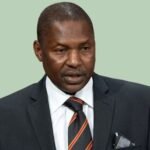In Nigeria today, fear and insecurity is no longer a stranger—it’s a neighbor. From the hills of Borno to the farms of Benue, across the sleepy towns of Kwara to the busy streets of Kaduna, insecurity has become part of daily life. For the average Nigerian, waking up is no longer a guarantee of making it back home alive.
Nigeria is on the edge. We are a nation grieving with no comfort. Our leaders speak, but their words feel like dust. They promise reforms, investigations, task forces—but the people keep dying. And when voices rise, they are accused of inciting panic.
In Kaduna, confusion over a recent explosion that claimed a young boy’s life has shaken public trust. While residents reported an IED blast on Josawa Road, the police dismissed it as a “dane gun discharge.’ One witness said, ‘We know what we saw, but they always try to water things down
But the truth is—we are tired. Tired of burying loved ones. Tired of dodging bullets. Tired of living in fear. Tired of praying and fasting while killers roam free.
How many more lives must be lost before leadership becomes action, not speeches?
In Niger State, fear runs so deep that Governor Umar Bago has declared a dusk-to-dawn curfew in an attempt to control violence. Many residents believe it’s not enough. ‘You can’t silence crime with curfews,’ said one Minna resident. ‘We need protection not lockdown’.
And then there are the kidnappings—a never-ending nightmare. From schoolchildren in Zamfara to commuters on highways, no one feels safe. Families have paid ransoms only to get back lifeless bodies. One father said, ‘We sold everything. They still killed him’
Police extortion adds salt to the injury. Citizens now fear those meant to protect them. On April 17, 2025, Izuchukwu Martins, a 100-level Political Science student at Lagos State University, was abducted and extorted ₦500,000 by armed policemen in Abule Ado. A youth from Lagos shared, ‘They harass us for money,arrest young boys for having iPhones, and shoot first before asking questions. If you survive criminals, you meet the police.’
The situation in Benue State remains dire. Fulani herdsmen continue to invade farms, destroying livelihoods and killing villagers. Yet when Governor Samuel Ortom launched an investigation recently, it focused on the death of 30 cows, not the dozens of people slaughtered. Families whose farms have been razed are left to fend for themselves.
Meanwhile, Boko Haram has taken over key areas in Borno State, including Gudumbali and Marte. Reports indicate women have disappeared, children recruited, and taxes imposed on the local population. The military has deployed troops, but attacks continue unabated.
Kwara State is not spared either. A new terror group, reportedly led by someone named Mahmoud, has caused unrest in Kaiama and surrounding areas. Residents speak of nights filled with silent fear, unsure if government visits will bring any relief or more empty promises.
The Easter tragedy in Gombe was another blow. A truck rammed into a religious procession in Billiri, killing several worshippers. While police initially reported brake failure, eyewitnesses insisted it was a targeted attack meant to cause terror.
Throughout the South-West, farmers no longer plant their fields, fearful of Fulani herdsmen wielding guns instead of cattle. Crops turn to ashes, while yams are destroyed by roaming animals. The police urge ‘amicable settlements,’ but how can peace be brokered when AK-47s are involved?
Across Nigeria—from Borno to Benue, Kwara to Kaduna—the pattern is the same: insecurity grows, promises fall flat, and citizens suffer.
Nuhu Ribadu, the National Security Adviser, recently compared Nigeria’s insecurity to that of Afghanistan and Sudan. Many Nigerians reject this comparison. They were put in these positions because they were capable, not to compare us to other failed states,’ said one analyst. We are not a benchmark for failure.
This is not a headline. This is our life. This is not just insecurity—it’s a national obituary, written one attack at a time. Nigerians don’t want sympathy. They want action. Real, honest, fearless action.
Because the people are tired of calming down. Tired of prayers without protection. Tired of promises that expire before the next body drops.
And they’re not just dying. They are being forgotten.
If you enjoyed this article, click here to read more informative posts, also check us out on Instagram for fun and engaging content.
Disclaimer: The opinions, views, and information expressed in this article are those of the author and do not necessarily reflect the official policy, position, or views of iNaijanow. The company assumes no liability for any errors, omissions, or damages arising from the use of this information.
















